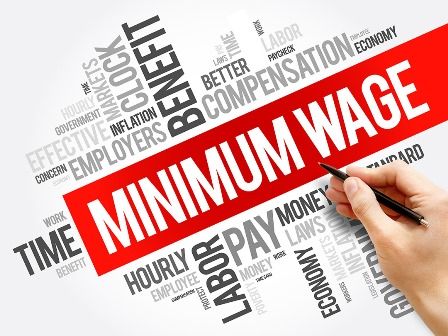
New Minimum Wage Set to Take Effect on March 1st, 2024. Here is what you should know
As the countdown to the implementation of the new minimum wage draws closer, the nation finds itself at the precipice of a profound transformation in its labour landscape.
With revised minimum wage regulations set to come into force on March 1st, 2024, employers across the country are bracing themselves for a pivotal moment that promises to reshape the dynamics of work and remuneration.
Gone are the days of robotic adherence to outdated wage structures. The recent disclosure by the Minister of Employment and Labour, Thembelani Waltermade Nxesi, signals a bold step towards fostering fairness and equality in the workforce. This adjustment, poised to impact businesses and workers alike, heralds a crucial stride towards ensuring equitable compensation and opportunities for all.
Here are Key highlights of the new minimum wage rates:
· Contract Cleaning Sector
In the Contract Cleaning Sector, minimum hourly rates will see adjustments across different areas. For example, in Area A Metropolitan Councils, the minimum hourly rate for Contract Cleaning employees will be R30.35, while in other areas of the RSA, the rate will be R27.67 per hour. All Areas in KwaZulu-Natal are subject to collective agreements in the Bargaining Council for the Contract Cleaning Service Industry (BCCCI).
· Wholesale and Retail Sector
In the Wholesale and Retail Sector, minimum wages will vary based on job categories and geographical locations. For instance, in the Metropolitan and Local Municipality area, rates will range from R27.58 to R73. 73per hour, depending on the job category.
· National Minimum Wage
The national minimum wage will rise to R27.58 per ordinary hour worked, marking an essential adjustment in labour compensation across South Africa. Notably, farm workers, domestic workers, and employees engaged in expanded public works programs will all see an increase to R27.58 per hour.
· Learnership Agreements
Workers engaged in learnership agreements will see adjustments in their allowances, The minimum allowance per week will range from R415.07 to R2421.13, depending on the level of their National Qualifications Framework (NQF) and the credits they have earned.
But this announcement is not merely stirring conversations; it’s igniting a nationwide dialogue among stakeholders from every corner of industry and commerce. Some voice concerns about the potential financial strain on businesses, while others champion it as a long-overdue measure to uplift marginalized workers and invigorate consumer spending.
Amid this discourse, Legal Director at Strata-g Labour Solution; Adv. Tertius Wessels underscores the imperative for employers to grasp the nuances of these changes. "While ensuring fair compensation is paramount, it’s equally vital for employers to navigate these adjustments effectively to ensure the sustainability of their businesses.”
Under the new legislation, employers are mandated to adhere to the revised minimum wage rates, which are designed to better align with the cost of living and prevailing economic conditions. Failure to comply with these regulations could result in penalties and legal ramifications, underscoring the importance of proactive measures and diligent adherence to labour laws.
The heart of the matter lies in the details of these new minimum wage rates, each a testament to a commitment to fair labour practices and economic equilibrium. From the Contract Cleaning Sector to Wholesale and Retail, from the National Minimum Wage to Learnership Agreements, each sector sees its tailored adjustments designed to better reflect the cost of living and prevailing economic conditions.
Yet, compliance is not just a suggestion; it’s a legal mandate with repercussions for non-adherence. As the deadline looms, employers are urged to not only acquaint themselves with the updated wage scales but also to ensure meticulous documentation and payroll adjustments. Proactive dialogue with employees is essential to usher in these changes smoothly and foster an environment of transparency and compliance.
“These adjustments underscore our commitment to fair labour practices, recognizing the diverse needs of different sectors and regions.
“Consultation with legal experts or industry associations is paramount to ensure full compliance. As we embark on this journey towards equitable compensation, collaboration and proactive measures will pave the way for a future where fairness reigns supreme in the workplace,” Adv. Wessels concludes.
NB: This gazette is also available free online at www.gpwonline.co.za
News Category
- International retailers
- On the move
- Awards and achievements
- Legislation
- Wine and liquor
- Africa
- Going green
- Supplier news
- Research tools
- Retailer trading results
- Supply chain
- Innovation and technology
- Economic factors
- Crime and security
- Store Openings
- Marketing and Promotions
- Social Responsibility
- Brand Press Office
Related Articles

NHI: Business gears up for possible legal battl...

Electricity Regulation Bill will open competiti...

Spar director fined R1 million after refusing n...

SARS wants to change VAT collection in South Af...


